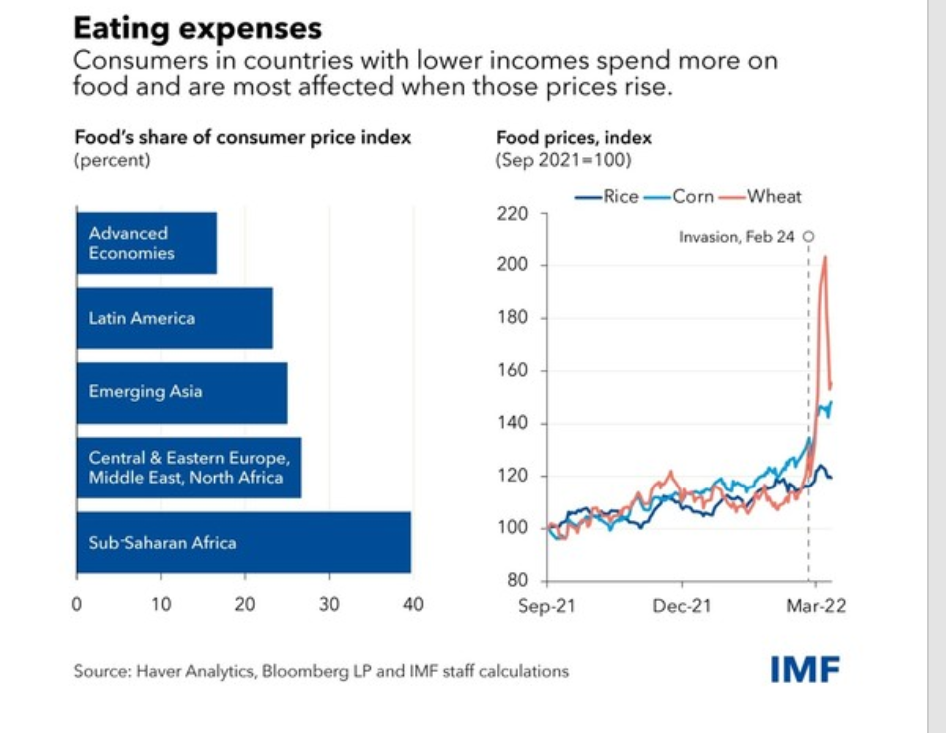A new IMF blog by Christian Bogmans, Jeff Kearns, Andrea Pescatori and Ervin Prifti concludes “Global food prices are poised to keep climbing even after jumping to a record in February, placing the heaviest burden on vulnerable populations while adding to headwinds for the global economic recovery.
While the blog doesn’t specifically mention Turkey, she certainly belongs to the distressed countries list. As in Europe, bread made from wheat is the staple food of the nation, and the fallback option for the very poor. Food and related items make up roughly 25% of CPI, while the most recent data on agricultural PPI revealed a massive 69% YoY increase, with February price surge at 14%. In a very telling sign of how high wheat prices are hurting the poor, the traditional Ramadan favorite, bread-derivative “pida” or flat bread prices were hiked 50% vs last year, while the size of standard loaf was reduced.
Going back to the blog:
Food commodity prices rose 23.1 percent last year, the fastest pace in more than a decade, according to inflation-adjusted figures from the United Nations Food and Agriculture Organization. February’s reading was the highest since 1961 for the gauge tracking prices for meat, dairy, cereals, oils, and sugar.
Now, the war in Ukraine and sanctions on Russia are upending shipments and possibly production for two of the world’s largest agricultural producers. The two countries account for nearly 30 percent of world wheat exports and 18 percent of corn, most of which is shipped through Black Sea ports that are now closed. Wheat futures traded in Chicago, the global benchmark, recently rose to a record.
The Chart of the Week shows how price shocks will have worldwide impact, especially on poor households for whom food is a higher share of expenses. Food costs account for 17 percent of consumer spending in advanced economies, but 40 percent in sub-Saharan Africa. Though this region is highly import-dependent for wheat, the grain constitutes only a minor share of the total caloric needs.
Civil Unrest Mushrooms Across Turkey | Real Turkey
Differences in diet are also significant. In Europe, where bread is deeply embedded in many aspects of its culture, wheat makes up about a quarter of diets. In Southeast Asia, wheat accounts for only 7 percent versus 42 percent for rice, for which price increases so far have been relatively contained. Country-level averages, however, mask substantial differences within nations as poor households tend to eat more cereals but less meat, vegetables, and fruits compared with middle-income households.
Finally, disruption may be even greater for countries with close trade links to Russia and Ukraine, including in Eastern Europe, the Caucasus, and Central Asia. High wheat prices will weigh even more on economies in the Middle East and North Africa, such as Egypt, which are especially reliant on Russian exports.
Turkey’s Conundrum: How robust growth and poverty go hand in hand?
Looking forward, reduced fertilizer supplies and higher oil prices will increase costs for harvesting, transporting and processing food. Policymakers must prevent those pressures from fueling food insecurity by avoiding protectionism and increasing social assistance for the poorest.
The world may also call upon the two largest economies if the situation worsens. In the United States, where about 40 percent of corn production goes to ethanol, policymakers could reassess that use. And China, which holds more than half of global wheat and corn reserves, could consider releasing supplies to lower prices.
For Turkey, soaring grain and oilseed prices, coupled with agricultural bottleneck and a weak currency spell disaster for the poor. A recent study found the following disturbing facts:
11.37 million people in Turkey, or over 13% of the country’s population, received state financial support in 2021, daily Sözcü said, citing a report by the Ministry of Family and Social Services. This was up 2.58 times from 4.4 million in 2020.
Based on IMF-FAO price projections, Turkey could also witness mass social unrest against the regime of Erdogan, which refuses to fight inflation with orthodox policies.
Follow our English language YouTube videos @ REAL TURKEY:
https://www.youtube.com/channel/UCKpFJB4GFiNkhmpVZQ_d9Rg
And content at Twitter: @AtillaEng
